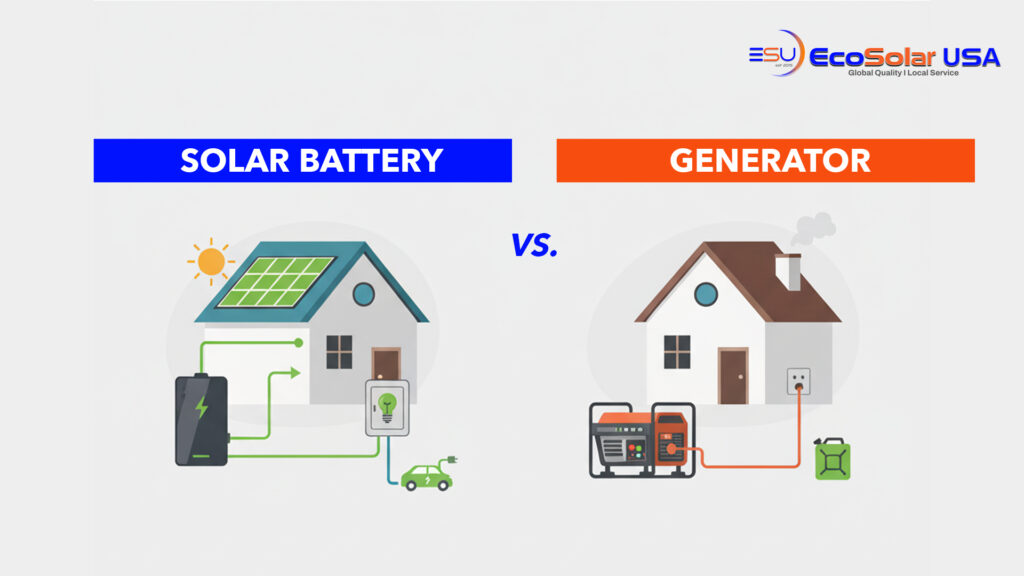
When the lights go out, every homeowner wants peace of mind — knowing their home stays powered. Whether it’s a storm, wildfire shutdown, or heatwave outage, reliable backup energy is no longer optional in California and Texas.
Today’s big question is:
Should you invest in a solar battery backup or a whole-home generator?
Both can keep your lights on, but one stands out as the smarter, cleaner, and more cost-effective long-term choice: the solar battery.
1. How Solar Battery Systems Work (and Why They’re Different)
Solar battery backups work hand-in-hand with your rooftop solar system.
Here’s what happens:
- Solar panels generate electricity during the day.
- Excess power charges your home battery (like a Tesla Powerwall or Enphase IQ Battery).
- At night or during a grid outage, the stored energy powers your essential home circuits — automatically, quietly, and safely.
- When sunlight returns, your battery recharges again.
Unlike a generator, which burns fuel and needs manual refueling, a solar battery runs entirely on renewable energy and operates silently in the background.
2. Whole-Home Generators: Old-School Backup Power
Traditional generators — whether propane, gas, or diesel — have one job: start up when the grid fails.
They’re effective but come with major drawbacks:
- Constant noise and fumes
- Ongoing fuel costs and delivery issues during disasters
- Regular maintenance (oil changes, filters, spark plugs)
- Delayed startup when outages hit
In short, generators provide temporary security but no ongoing savings or environmental benefits.
3. Solar Battery vs Generator: Side-by-Side Comparison
| Feature | Solar Battery Backup | Whole-Home Generator |
| Energy Source | Clean, renewable solar | Gas, propane, or diesel |
| Noise & Emissions | Silent, zero emissions | Loud, exhaust fumes |
| Operating Cost | Extremely low | High (fuel + maintenance) |
| Maintenance | Minimal | Frequent servicing required |
| Tax Credits & Rebates | Eligible for Federal Solar Tax Credit (through 2025) | Not eligible |
| Power Duration | Hours to a day (expandable with solar) | Continuous (fuel-dependent) |
| Bill Savings | Reduces utility costs daily | No benefit until outage |
| Outage Response | Instant, automatic | Short delay on startup |
💡 Bottom line:
Solar batteries give you both backup power and everyday savings, while generators cost more over time and don’t help until something goes wrong.
4. Cost Breakdown and Long-Term Value
According to EnergySage, a high-capacity solar battery (around 13.5 kWh) costs roughly $9,000–$12,000 after incentives, depending on brand and installation.
Generators, on the other hand, cost $7,000–$15,000 installed — but that’s only the start.
Over 10–20 years, fuel costs, maintenance, and part replacements can double the total expense.
Meanwhile, a solar battery:
- Stores free solar energy every day
- Reduces electricity bills (especially under time-of-use rates in California)
- May qualify for SGIP incentives (California) or utility rebates (Texas programs like Oncor or CPS Energy)
- Extends the life of your solar system
So while a generator might seem cheaper upfront, the solar battery pays you back every month — and keeps working quietly for years.
5. Weather & Outages: Why Solar Batteries Shine in California and Texas
California
- Average of 280–300 sunny days per year (Source: U.S. Climate Data)
- Frequent Public Safety Power Shutoffs (PSPS) due to wildfire risks
- High time-of-use electricity rates — perfect for battery time-shifting
- Excellent state rebates through SGIP (Self-Generation Incentive Program)
Texas
- Averages 230–260 sunny days per year (Source: NOAA)
- Faces severe storms and grid instability — nearly 60–70 major outages per year (Source: U.S. Energy Information Administration, 2024)
- Batteries paired with solar provide instant, automatic backup without relying on fuel — a huge benefit during power crises like Winter Storm Uri.
With so much sunlight and growing grid stress, solar battery systems are the most reliable and sustainable solution for both states.
6. Hybrid Systems: The Best of Both Worlds — But Often More Than You Need
For homes in remote or storm-prone areas that experience multi-day power outages or have limited sunlight, a hybrid system — combining a solar battery and a backup generator — can provide maximum energy security.
In this setup:
- The solar battery handles daily power use and short-term outages.
- The generator automatically turns on when the battery runs low.
- The result: lower overall fuel consumption and reduced emissions compared to a generator-only system.
However, for most homeowners in California and Texas, investing in a hybrid setup isn’t necessary.
Both states enjoy abundant sunshine and relatively short outage durations:
- California averages 20–30 grid outage events per year, often lasting under 4 hours.
- Texas experiences 60–70 outages annually, but most last less than 6 hours (EIA, 2024).
With this level of reliability, a solar + battery system alone can easily cover typical outages while also powering your home efficiently every day — without the fuel costs, noise, or maintenance that come with generators.
That makes solar + battery not just more reliable, but also more cost-effective and eco-friendly for most California and Texas homeowners.
Solar + Battery vs Hybrid System Comparison
| Feature | Solar + Battery | Hybrid (Battery + Generator) |
| Fuel Dependency | 100% renewable, no fuel needed | Partial fuel use |
| Maintenance | Low | Moderate to high |
| Outage Coverage | 6–24 hours (expandable) | Multi-day (fuel-dependent) |
| Noise | Silent | Moderate noise during generator use |
| Cost-Effectiveness | Higher — lower long-term costs | Lower — higher upfront and ongoing costs |
| Best For | Typical homeowners in CA & TX | Rural or off-grid areas |
7. Tax Credit Deadline — Why Acting Now Matters
The Federal Solar Investment Tax Credit (ITC) currently offers 30% off solar and battery installations, but it’s set to end after 2025 unless renewed by Congress.
That means installing or expanding your solar + battery system now locks in major savings before incentives disappear.
Adding batteries to your existing solar system also qualifies for the same tax benefits — but only if you act soon.
When comparing long-term cost, reliability, and environmental impact, solar batteries win across the board:
✅ Cleaner and quieter
✅ Lower operating costs
✅ Works with your solar to reduce bills year-round
✅ Eligible for tax credits and rebates
✅ Adds value and energy independence to your home
A generator may be helpful in rare extreme cases, but for everyday resilience and savings, solar batteries are the smarter investment.
Ready to Upgrade? Let’s Power Your Home the Smart Way.
If you’re a California or Texas homeowner considering solar or battery backup, now is the perfect time.
With tax credits still available and electricity rates rising, installing a solar battery system ensures you stay powered, protected, and independent.
🔋 Contact Eco Solar USA today for a free home energy consultation.
We’ll help you find the best solar + battery setup to fit your home, your lifestyle, and your budget — before federal incentives expire.



